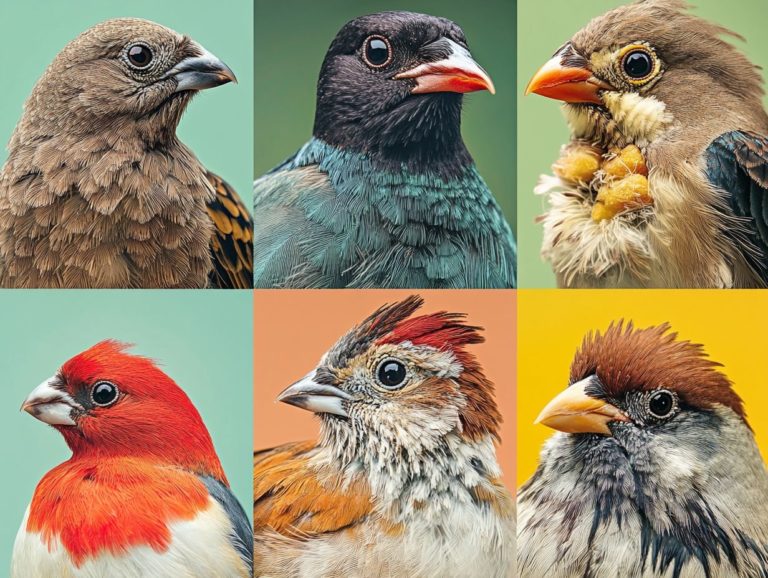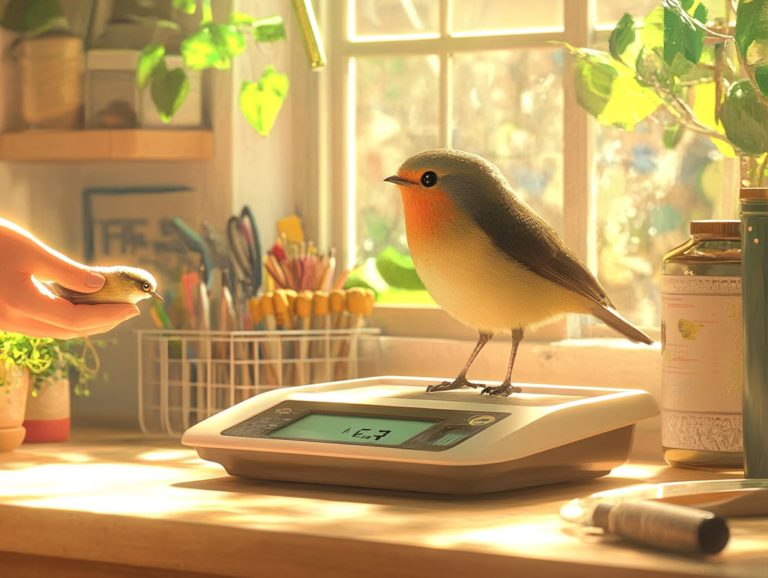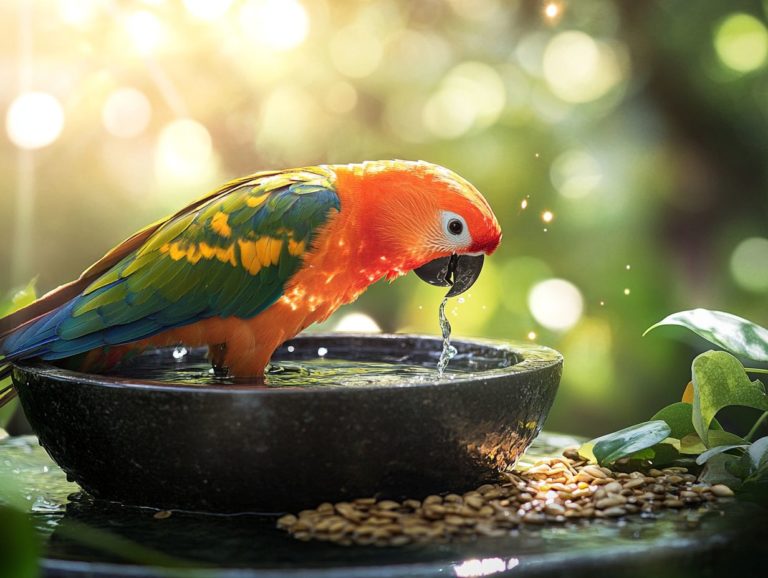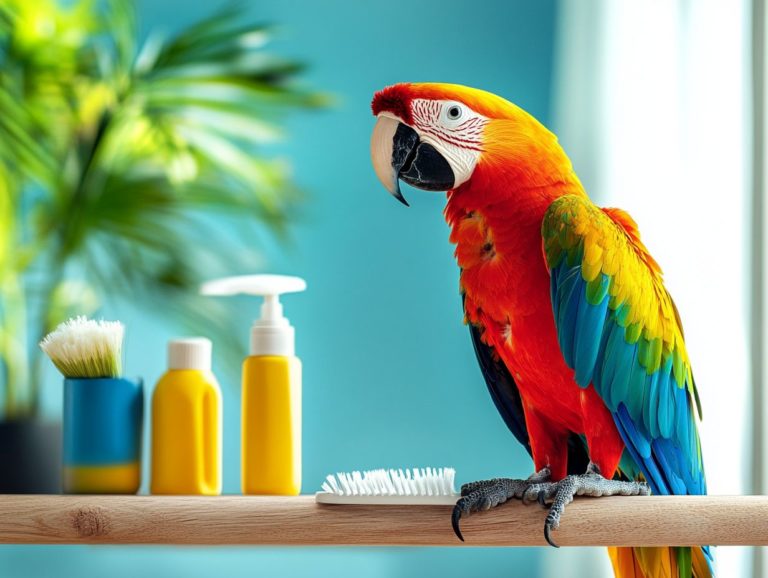The Effects of Aging on Pet Birds
Aging is an inevitable aspect of life that touches all living beings, including your cherished pet birds, particularly the delightful psittacine birds such as macaws, cockatoos, and African grey parrots.
As they age, you might notice a range of changes, from physical alterations to behavioral shifts. Spotting these signs quickly can make a world of difference for your bird s health, highlighting the importance of delivering the optimal care they deserve.
This article delves into the common age-related transformations, potential health issues, and vital strategies to elevate the quality of life for your avian companions. Learn how to make their golden years rich with joy and comfort while being mindful of their special needs.
Contents
- Key Takeaways:
- What Happens as Birds Age?
- Common Signs of Aging in Pet Birds
- Health Concerns for Aging Birds
- Caring for Aging Birds
- Improving Quality of Life for Aging Birds
- Preventing and Managing Age-Related Issues
- Frequently Asked Questions
- 1. What are some common effects of aging on pet birds?
- 2. How does aging affect a pet bird’s diet?
- 3. What changes should I expect in my elderly pet bird’s behavior?
- 4. Are there any specific health concerns I should watch out for in aging pet birds?
- 5. How can I help my aging pet bird maintain its quality of life?
- 6. Is it possible to extend the lifespan of a pet bird?
Key Takeaways:
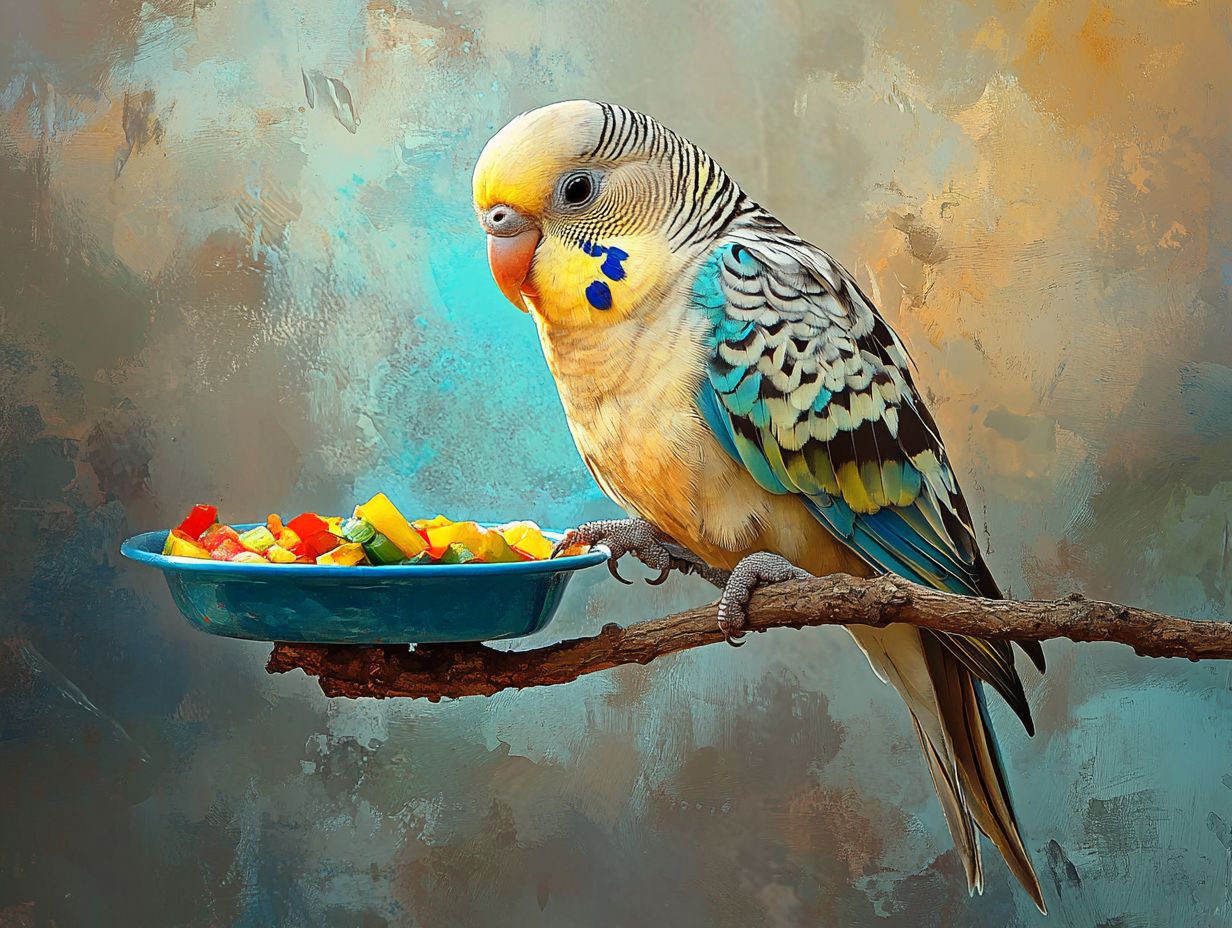
- As birds age, they may experience physical changes and behavioral shifts due to decreased mobility and energy levels, underscoring the importance of weight monitoring and regular health screenings.
- Aging birds can develop age-related illnesses, making regular vet check-ups and proper care crucial.
- To improve the quality of life for aging birds, provide them with enrichment activities and continue to bond with them.
What Happens as Birds Age?
As birds age, especially delightful psittacines like macaws, cockatoos, and African grey parrots, they experience a range of physical changes that can profoundly affect their health and well-being.
Geriatric birds exhibit aging symptoms in various forms, such as a decreased metabolic rate, mobility challenges, and shifts in feather condition. By understanding these aging mechanisms, you can collaborate with caregivers and avian veterinarians to develop effective ways to meet the nutritional needs of aging birds, ultimately enhancing the lifespan expectancy and quality of life for these beloved companions.
Common Signs of Aging in Pet Birds
Recognizing the common signs of aging in pet birds is essential for ensuring timely intervention and effective health monitoring. These indicators can differ significantly across species, from budgerigars to Amazon parrots, and may include signs of malnutrition and other health conditions.
As a responsible owner, remain attentive to any dietary changes, signs of malnutrition, and the overall condition of your bird’s feathers. These factors can reveal underlying health issues, such as arthritis or heart disease, that warrant your immediate attention.
Physical Changes and Behavioral Shifts
As your birds age, you ll notice various physical changes and behavioral shifts that could signal underlying health issues, such as joint problems or oxidative damage. You can observe alterations in their grooming habits, reduced mobility, and changes in how they socialize each of these changes requires your keen observation, including regular eye exams and veterinary visits.
Weight fluctuations are common. Some older birds may pack on the pounds due to decreased activity levels, while others might shed weight if they struggle to eat or experience metabolic changes. This highlights the importance of health monitoring.
Feather quality often declines, resulting in dull or molted feathers, which can reflect nutritional deficiencies or overall health. Joint health also deserves your attention; conditions like arthritis can make them hesitant to move or perch comfortably.
Behaviorally, you may notice a reduced interest in play, less vocalization, or changes in their bonding dynamics with you. Regular health screenings and physical exams are essential for effectively monitoring the well-being of your feathered companions.
In conclusion, consult with your veterinarian about your bird s specific needs as they age to ensure they lead a healthy, happy life.
Health Concerns for Aging Birds
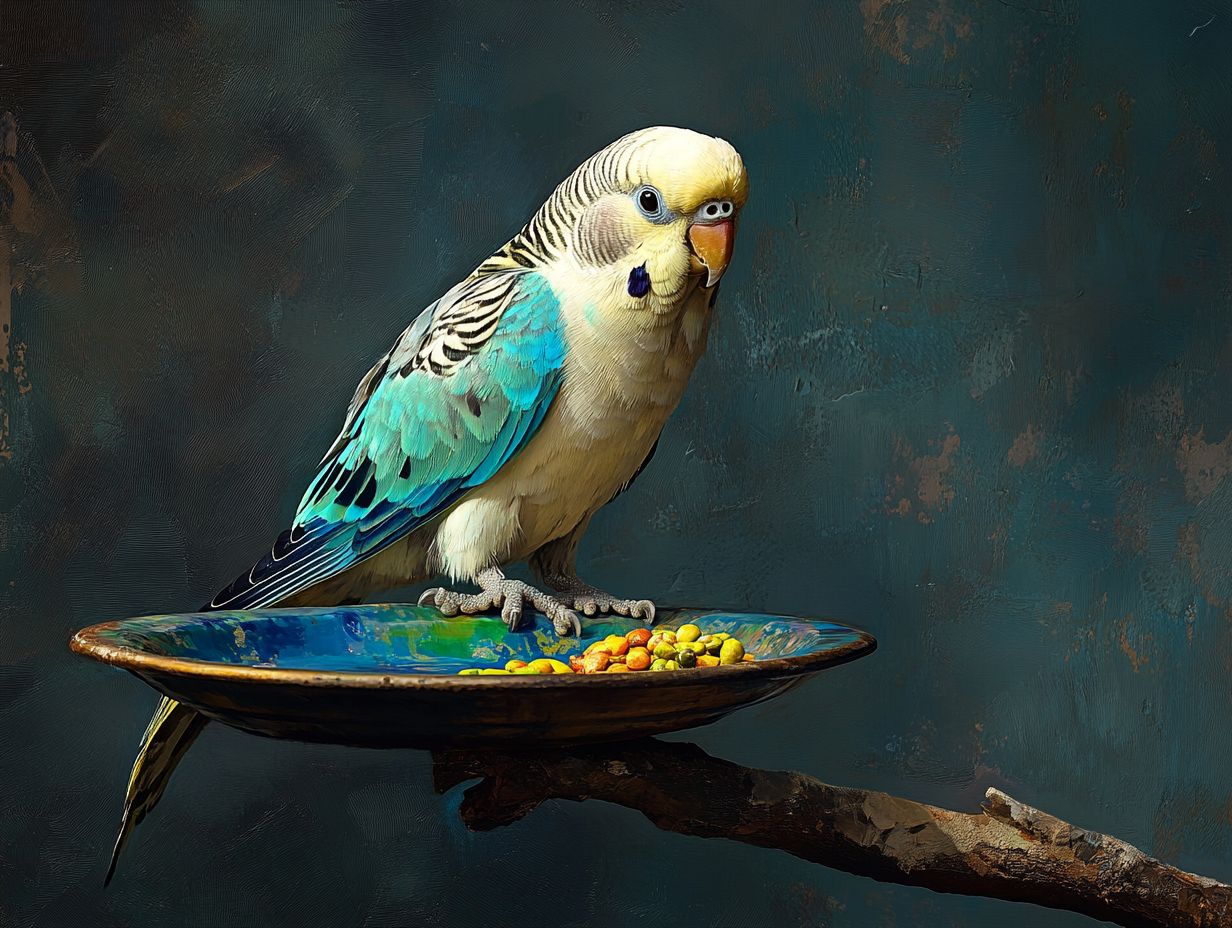
Aging birds encounter a range of health challenges that can affect their quality of life and longevity. As they grow older, they become more susceptible to chronic diseases such as kidney, liver, and heart ailments, making it crucial to understand the effects of malnutrition in birds.
This heightened risk highlights the importance of proactive health monitoring and regular veterinary visits to detect and manage these conditions.
By staying watchful, you can help ensure that your feathered companions maintain their well-being as they age.
Age-Related Illnesses and Conditions
Age-related illnesses in birds, like arthritis and obesity, can significantly impact their overall health. These issues frequently arise from nutritional imbalances or malnutrition.
Regular health screenings and dietary assessments are essential to catch potential problems early. As your birds age, you might notice signs of arthritis, such as struggles with flying or preening. Obesity could manifest as lethargy and a lack of interest in their usual activities.
Tackling these issues requires understanding the underlying causes, often related to insufficient dietary diversity or excessive caloric intake. Implementing a balanced diet loaded with essential nutrients and cutting back on unhealthy treats can greatly reduce these risks.
Preventative measures, like routine veterinary check-ups and dietary assessments, are vital for monitoring their nutritional needs. This proactive approach fosters healthier, happier lives for your aging birds.
Caring for Aging Birds
Caring for aging birds is a rewarding journey that requires a personalized strategy that caters to their unique needs. This strategy ensures they receive the health care and support essential for their transition into their golden years.
Tailoring their care may mean adjusting their diet to align with their changing nutritional requirements. It may also involve a greater focus on grooming for their comfort and increased social interaction to nurture companionship.
Special Considerations and Tips
When caring for aging birds, several special considerations can significantly enhance their quality of life:
- Regular veterinary visits and preventive health measures tailored to their specific needs.
- A thorough dietary assessment to ensure they receive adequate nutrition.
- Grooming techniques that help maintain their feather condition and overall health.
Keep a close eye on any behaviors that may indicate discomfort or health issues; act quickly to address any signs of discomfort! Providing a balanced diet rich in whole foods, along with supplements if necessary, supports vital functions that may decline with age.
Regular veterinary check-ups not only help monitor your bird s health but also offer valuable recommendations for vaccinations and screenings, ensuring proactive management of any potential health conditions.
Grooming practices, such as regular bathing and nail trimming, are vital for ensuring comfort and preventing health complications. By understanding the mechanisms of aging, you can create a nurturing environment that adapts to the changing needs of your feathered companions.
Improving Quality of Life for Aging Birds
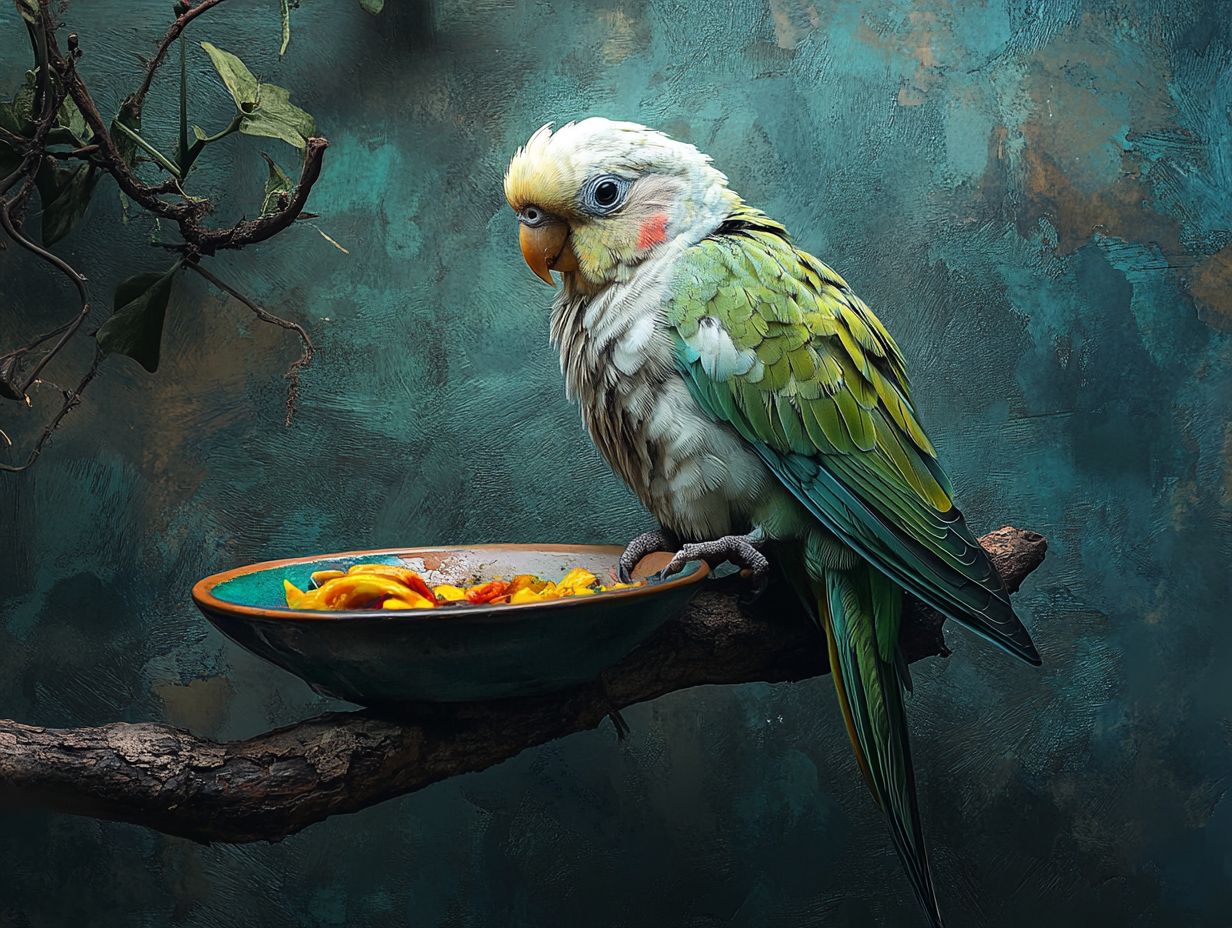
Enhancing the quality of life for aging birds requires a nuanced approach that combines enrichment and bonding activities to engage their minds and nurture companionship.
Incorporating interactive play, providing foraging opportunities, and encouraging socialization can profoundly elevate their emotional well-being, helping to mitigate the challenges associated with aging.
Enrichment and Bonding Activities
Engaging your aging bird in enrichment activities is essential for their mental well-being. These activities also strengthen the bond between you and your feathered companion.
Activities like interactive play, foraging opportunities, and a variety of toys can stimulate their senses and encourage natural behaviors while addressing their nutritional needs and grooming habits.
Using foraging toys that require problem-solving enhances cognitive skills and mimics their natural hunting instincts. Simple games, such as hide-and-seek with treats, can spark their curiosity while providing an enjoyable way to connect.
Incorporating perches and swings into their space promotes physical activity, benefiting both their fitness and mental agility. Regularly refreshing their environment keeps things exciting!
Engaging in straightforward training exercises or teaching new tricks can build trust and improve interactions, ensuring a happier, healthier life for your beloved avian friend.
Preventing and Managing Age-Related Issues
Preventing and managing age-related issues in birds is crucial for enhancing their overall health and extending their longevity. By taking steps such as regular health monitoring, changing their diet, and understanding treatment options which may even include potential surgical interventions you can significantly elevate the quality of life for your aging feathered companions, especially considering the implications of chronic diseases.
Preventive Measures and Treatment Options
Adopting preventive health measures and understanding treatment options is essential for managing aging symptoms in birds, especially in species like cockatiels and budgerigars. Regular veterinary care, including avian diagnostics and tailored nutritional needs, plays a significant role in mitigating age-related conditions.
This includes providing a balanced diet rich in essential vitamins and minerals, enhancing overall well-being and supporting immune function. Frequent veterinary check-ups are vital to catch early signs of potential issues, allowing for timely interventions. It’s important to remain vigilant for any behavioral changes, as these can signal discomfort or illness.
For common aging symptoms like arthritis or feather plucking, you have a range of choices that may include dietary supplements and behavioral therapies. By creating an environment that emphasizes mental and physical stimulation, you can significantly enhance the quality of life for your aging feathered companions.
Frequently Asked Questions
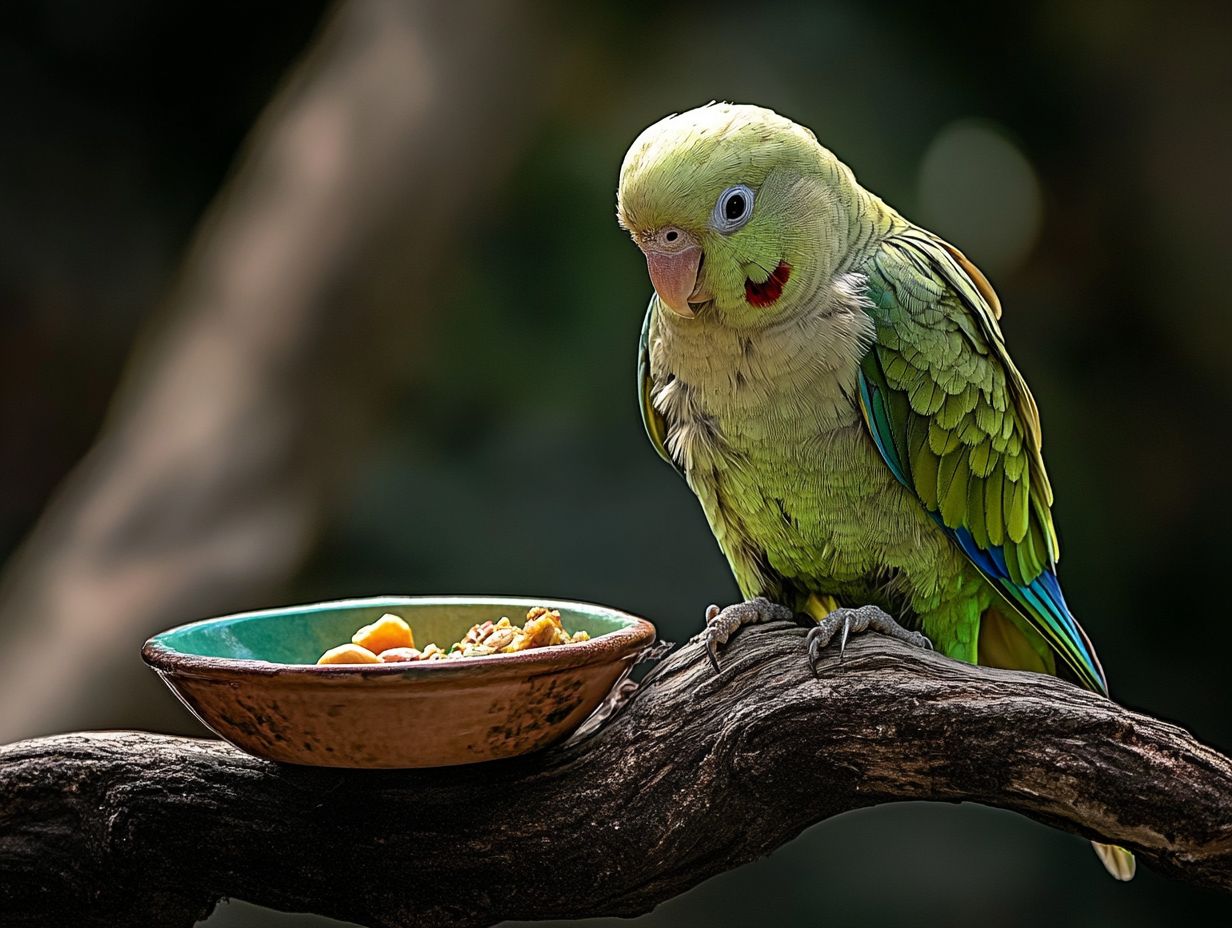
1. What are some common effects of aging on pet birds?
Older birds may have lower energy levels and changes in appearance or behavior.
2. How does aging affect a pet bird’s diet?
Older birds may have difficulty digesting certain foods and may need a more specialized diet to meet their nutritional needs. They may also have a decreased appetite or difficulty eating due to dental problems or other health issues.
3. What changes should I expect in my elderly pet bird’s behavior?
Elderly birds may become less active and playful, spending more time sleeping. They may also develop behavioral issues such as aggression, vocalization changes, or repetitive behaviors.
4. Are there any specific health concerns I should watch out for in aging pet birds?
As birds age, they may be more prone to diseases like arthritis, heart disease, and respiratory issues. Owners should look out for signs of vision or hearing loss, as well as changes in their bird’s weight and feather condition.
5. How can I help my aging pet bird maintain its quality of life?
Regular veterinary check-ups and a balanced diet are key to keeping your pet bird healthy in its golden years. Providing mental and physical stimulation, along with a comfortable and safe environment, can greatly improve their quality of life.
6. Is it possible to extend the lifespan of a pet bird?
There s no guaranteed way to extend a bird’s life. However, proper care and spotting health problems early can make a big difference.
Some bird species live longer than others. It’s crucial to research your pet bird’s specific needs and potential lifespan.

